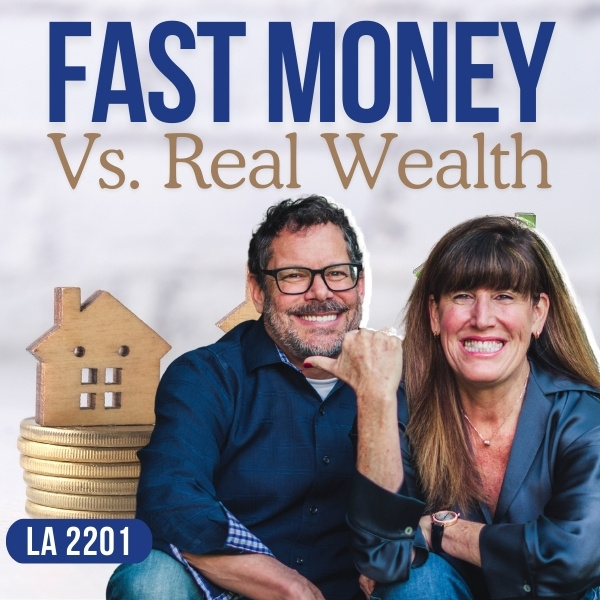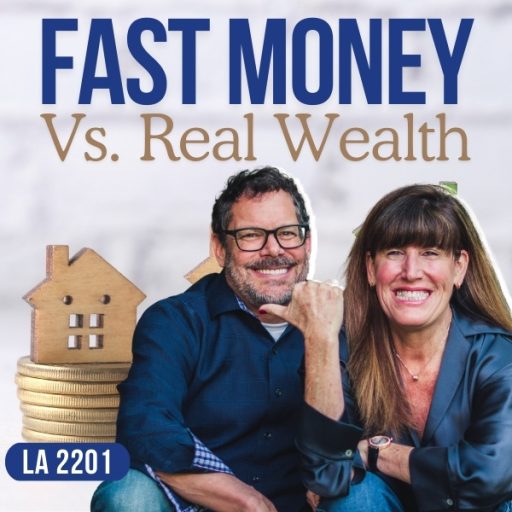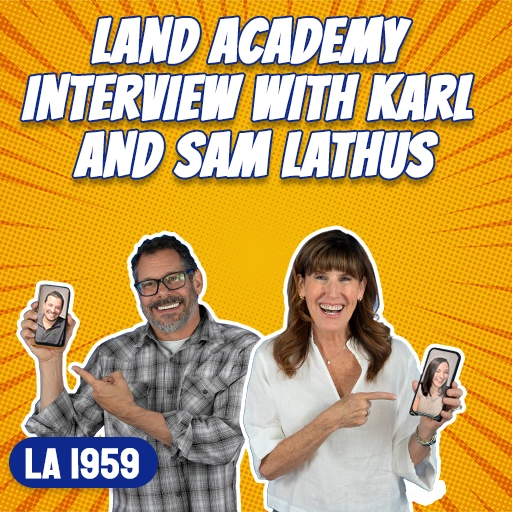I’m Steven Jack Butala.
I’m Jill DeWit, and this is The Land Academy Show.
Importance Of Planning For Both Fast Money & Wealth
This is episode number 2201. Jill and I are talking about the difference between fast money and wealth building, specifically in real estate, these two things. You have to have a plan for both. I would highly recommend that you have a plan as early as possible in your life for making some good dough, fast dough, and creating wealth with some of that fast dough.
We’ll explain it because I’m sure it’s like, “How fast is fast?” We’ll get into this here in a few minutes, so you know what we’re talking about. This isn’t like overnight. We’re not day trading. That’s not what we’re talking about.
My point is, please have a plan that at least addresses both of those. Most people have a long-term plan, like a 401(k). Whether they know it or not, they’re planning to work until a certain day in their lives. We’ll get into that in a second.
Also, a certain dollar amount. That’s what I think our world is more likely, “When I hit this financial goal, now, I’m going to make some different decisions.”
Each day on the show, we answer a question from our Land Academy member Discord forum. We take a deep dive into land-related topics, by your popular requests.
Florida Real Estate Challenges: Floodplains & Paper Subdivisions
Ben wrote, “Hi, folks. We’re getting calls back from our mailer in Florida. Most of the people calling back have properties in a floodplain.” No kidding, because Florida is a floodplain. I would say 90%. I don’t know, but it’s a lot. “Is it an automatic no-go for these properties in your experience? Is there a creative way to make these deals work? Also, a lot of the lots and parcels don’t look like they have access directly from a road. Is it possible they have dated legal access, but do not have direct road access to huge deals as well? Please advise. We have several people waiting here. Thanks.” Can I talk about two things right off the top?
Sure.
One is Florida, yes. Two common things happened in Florida. I can’t explain why. I don’t know. I guess it was a sign of the times, but one of them is the flood. That’s a real thing. There are a lot of places in the South, like New Orleans, for example. Most of that land is below sea level. You have to account for stuff like that. There are wetlands and things like that that you have to watch out for. Some of it, you can build upon. Some of it, you cannot. A lot of that, when you build upon it, you still have to make some improvements. It has to be above x-number of inches,
I love watching these HGTV shows when they’re buying lakefront property, where it’s a full 10 to 15 feet that they have to build up. They park their cars under or make it a wreck area, and then the house is way up high. It’s stuff like that. It could be inches, it could be feet. It could be a whole story. They have to build above, and then you can put your house up there. Otherwise, you won’t get insurance because water could go under there. That’s one thing. The second thing is what I was referring to as the sign of the times. What I want to say is it was in the ‘60s or ’70s when they did all these paper subdivisions. In the ‘50s, people would buy a piece of land, and they didn’t have to put in any infrastructure. They could pretty much draw in roads and where it would go, and start selling lots. It never got built out. You want to be careful of that.
Never will. What Ben was saying, and I’m reading between the lines here, is, “I mailed Florida, properties are coming back, and it’s not passing the A’s. We’re veering kind of far. The most recent Land Academy Crew, I like their velocity and attitude, but they’re not going through the program maybe the way they should, or listening to a Thursday call, or even listening to the show. Jill and I have spent decades putting together a program based on our experience. These things are addressed if you just take them step by step.
Ben sent to deal out here, a mailer out, and he’s getting properties back that aren’t qualifying from a due diligence standpoint that we have summarized as the eight A’s. Number one, properties don’t have any access. It’s very common in Florida, as Jill has said. We call them paper subdivisions. They took a huge piece of paper, drew squares on it, subdivided it, and then filed for new assessor parcel numbers in the ‘50s and ‘60s.
Those properties generally have very low value, and we avoid sending mail there. We check that out before we decide to send the mail out at all. Number two, Florida is one big wetland. I don’t care how you slice it. There are a few exceptions. Wet property in. Florida is normal. Wet property in Nevada is crazy, not normal. It’s the exact opposite.
You have to do the research on what’s wet. How is it wet? There are lots of different types of wetlands. It’s very complicated. The truth is, Jill and I are not wetlands experts by choice. We do not buy and sell real estate in areas that we believe are wet, There are only a few places in the country. She named two of them, Southern Louisiana and Florida.
We have done deals. I would do deals with other people who know them very well, or it takes a little extra time. That’s the whole thing.
With that said, we’ve talked about niches before, and Florida is a niche. There are people in our group who have made tons and tons of money buying and selling land in Florida because they grew up there. They understand real estate. They spent a few years getting to know which places are the best to sell or not to sell. Ben, I love your enthusiasm, but I think you should spend 2 or 3 days calling around, or however you do research, to check out what’s going on in Florida.
Here’s what’s going to happen, Ben, in reality. Go down the path. You got four calls, and it’s in such and such subdivision, let’s say. Go down the path, find out what’s possible there, what the building restrictions are. Is there any real access? Is there any chance to build? That will be one phone call to the county. Now you know, any other person who’s going to call you like, “I’ve got a property in,” fill in the blank subdivision, you’re going to cut them off right there, so you’re not wasting anybody’s time.
That’s okay. It’s a learning process. No problem. This is not anything you did, “I screwed it all up, failed mailer.” Who cares? You might still get something out of this. If you did what we suggested you do, and mail out a bunch of things in a county, maybe there are some little pockets in here that you’re going to get something great out of it. That’ll pay for the mailer, so don’t feel bad.
As an aside, and then we’ll move on to the topic. Florida is going through what will end up being, mark my words, one of the largest real estate changes that will define this century. They are having huge, over and over again, climate issues. Insurance companies are pulling out, and everybody wants to move there. We have a huge influx of people who have been moving there since the ‘40s and ‘50s, since air conditioning. It’s a great place to be. It’s a great place to live, and it’s beautiful. I’ve been there many times. I don’t know if you have been there many times.
I have been there many times. Thank you.
Insurance companies are having a harder time justifying flood potential and natural disaster potential, especially because values are skyrocketing, and everybody wants to move there. Please watch that. I’m not saying don’t send mailer. I’m saying if you’re interested in real estate as a topic in the world, please watch what happens in Florida and Southern California. Both of those places are experiencing things that are turning insurance companies completely away. It’s not how much does it cost to insure my house?
Can you get it? Companies are pulling out.
You can no longer insure houses in Southern Florida.
There you go. Okay.
Today’s topic is the difference between fast money and wealth. I feel like you have things to say on this topic.
First, I want to explain it. Fast money is not day trading. That’s not what we’re talking about. I’m talking fast money to be 30, 60, to 90 days turn around, cash in, cash out. I would classify that as fast. Wealth building is the long play. This is an interesting topic because we could take this in a bunch of different directions. It depends on where you are in your career and your financial situation, and how you make these decisions.
I’m thinking of this right now because we are constantly going through this. Every 3 to 5 years, you and I have conversations like this. We’re looking at our total cash balance. We’re looking at what assets we have out there, including personal ones, mostly personal ones. Let’s just say this, the only thing that I have in play right now is pretty much a personal asset. There’s a reason for it, not as much the long-term rental game. Why? It’s because I can’t make money as fast that way as I can in other things, and so we put it back in. It’s so interesting, and that ties to whatever we talked about on Monday. What are you thinking that you want?
Two Paths To Creating Equity: Acquisition Expertise Vs. Value-Added Assets
There are two ways on this planet that I know of for creating equity or making real money. Number one, you become an acquisition expert, which is what John and I have chosen. It’s what we teach in The Land Academy, instead of another way. We buy stuff under its value for an as-is, where-is condition. We buy a piece of land for $20,000, but we know it’s worth $80,000. Why? Because we are acquisition experts.
Number two, you create equity by buying an asset, hopefully undervalued, but you buy an asset, and you improve it somehow. You buy a bunch of components from suppliers. If you put them all together and now you’ve got a Samsung television, and you sell that TV for more money or more value than some of those parts altogether. Those are the two huge ways, basic ways of creating equity. How fast you’re buying them undervalued is imperative in both scenarios. How you liquidate those is the topic today.
You’re either going to resell it fast, usually for less money, or you’re going to build some type of entity around creating equity, like Samsung did in televisions, and you’re in for the long haul, then there’s branding and all kinds of things that can happen for generations after generations. For real estate, a great difference is buying a piece of land for $20,000 or $30,000 and selling it for $80,000, or buying a rental house. Maybe paint it, put some carpet in, and rent it out, then deal with that, however you deal what that from a management standpoint.
Those are the real differences between fast money and wealth building. You should have a plan for both, but please hear this. Here’s my whole point. I’m going to send this back to Jill. In both cases, in my career-long opinion, it is imperative to learn how to buy undervalued assets on the front end. You never want to go out on the market and buy a house and run it out. You want to implement the things that we teach at The Land Academy. Buy it undervalued because you have to get out of it. Buy low and sell high has never been more important.
I agree with everything you said. As you said, there’s fast money and wealth building. I look at it like this. A big thing for me is fast money is I need to get to this certain level, then I relax and I work on the wealth building, if that makes sense.
I agree with you. Here’s the real straight truth about Jill and me. It’s what Jill had said. We created the most wealth that we have through fast money deals.
We put our heads down and build up this crazy cash balance. That’s what we did.
We’re still plowing cash into our wealth with each deal.
For you, right now, wherever you are in your career, and you’re thinking about this, hopefully, you have a number. Maybe it’s $1 million. Maybe it’s $5 million. I don’t know what it is, but I hope you have that number where you hit that, and now you’re going to start making some different decisions, and then pivot to wealth building because the long-term goal is there.
Right now, you’re making money to hit these goals, and then you’re going to have enough where the money is going to do the work for you. That, to me, is when you’re in wealth-building mode, and that’s exciting. We’re like, “I don’t do this this fast.” Now, I have enough money. I can live off the interest, I can put it over here, I can collect this rent, live off of that. How can I do that? We always preach that you pay for it.
You’re not financing things. You’re not taking the triage and living off of that. You’re buying an asset for cash, managing that low amount, living off the rent, and building all that. Maybe it’s ten of them. Who cares? Ten rentals at $2,000 a month that you’re netting. If you can’t live off of that, we’ve got to talk. Now, your wealth-building.
When you talk like this, it makes me want to kiss you on the lips.
I didn’t think that was possible today. That’s nice.
The Four Stages Of Wealth
I told my kids that there are four stages of wealth. Number one, you were making more money than you’re spending. Sounds stupid, but we probably all have been there. Have you ever been in a situation where there’s $3,000 a month coming in and you spend $5,000? I don’t mean because you like Scotch. I mean, your rent is too high, or you met the wrong girl, or something happened.
You lost a job.
You have to figure that out. That’s stage one. You figured out how to make more money than you are spending. A good rule of thumb for what I taught them, some of them paid attention and some didn’t, was that paycheck number one goes for expenses, and paycheck number two goes into savings each month. When you finally have a little bit of money, you go have fun with it because you have to live.
Number two is you’re starting to save money. You were making more than you’re spending, but you’re now starting down the path of saving money. I don’t know what that means to you. For a lot of people, it means a 401(k). It never did for us. It might mean I’m taking the extra $30,000 a year that I made, and I’m going to buy a piece of land and resell it. Start something on the side like that. That’s stage two.
You are doing that. Stage three is the thing that you started on the side, where you’re making more money than in your job. I love stage three. Stage three is like, “I’m a real person now. I do not have to work in this job. I’m on my way to paying off my mortgage or some version of that. That stage three has always been my favorite.
Stage four is where Jill and I are now, as she mentioned. Your side business has now been institutionalized, like The Land Academy, and for us, buying and selling land. Now you’re plowing this money into your wealth. You want to get to stage four, and you want to get to it as fast as you can without jeopardizing risk.
A lot of startups are so risky and so overcapitalized. It’s so silly, especially the ones out of Palo Alto. There’s so much available investment money in Palo Alto that I see a lot of people in startups, young and smart people, spinning their wheels because they have too much money instead of focusing on something that means something to them and basic, intelligent wealth-building stuff.
Perfect.
Join us in the next episode, where Jill and I are going to discuss land investing lessons from other real estate sectors, like houses, commercial real estate, and other types of property besides land. You are not alone and your real estate ambition. We are Jack and Jill. Information and inspiration to buy undervalued property.















